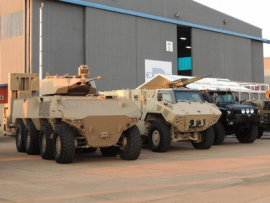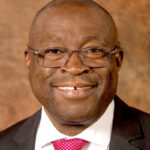Denel says it is ready to move into the next phase of its strategic drive to strengthen its business and create a long-term, sustainable future based on improved business efficiencies and growth.
This after the decision announced by Finance Minister, Enoch Godongwana, in his Medium Term Budget Policy Statement (MTBPS) to re-capitalise the State-owned aerospace and defence company with R3.4 billion.
Denel has described the move as a critical step in rebuilding the State-owned entity, which is led by the Chief Restructuring Officer, Riaz Saloojee, who plays a critical role in ensuring the successful turnaround of Denel.
According to the Group CEO of Denel, Mike Kgobe, the State’s decision to recapitalise the entity is a vote of confidence to stabilise the company as it emerged from a sharp downturn, caused by mismanagement, State Capture and governance failures.
“This will enable us to proceed with the streamlining of the business and establish a base from which we can significantly grow our order book and access new revenue streams,” he said.
National Treasury, the Department of Public Enterprises and the Denel Board of Directors will monitor the R3.4 billion injection, which is attached to strict conditions.
“Government, as the sole shareholder, clearly recognises the strategic importance of Denel as a commercially-driven aerospace and defence company and the immense value we can add to the economy in terms of innovation, creation of intellectual property and export revenue generation to contribute to the balance of payments,” said Kgobe.
The immediate actions by management with oversight of the Board, according to the entity, is to exit non-core assets and realise cash inflows towards the R1.8 billion that will contribute towards its turnaround plan.
In addition, the company is proceeding with actions to align the costs of running the business with the current revenue base while retaining core capabilities for growth.
“The focus is now shifting to a critical stage in which we need to sustain the new business model which is emerging,” said Kgobe.
In this phase, Denel will also reduce the current operating divisions from six to four to continue to deliver world-class products across the spectrum of aerospace, defence and related technologies.
This includes traditional domains of the battle space of land, sea and air, to new domains of cyber and civil security.
Kgobe acknowledged that the previous business structure of Denel was unsustainable, which required a fundamental restructuring and a reduction of the cost base to affordable levels.
“The company will now begin to reduce its geographic footprint, rationalise its facilities and implement a shared services model in areas such as supply chain management, human capital and development, information and communication technology as well as finance and public affairs.”
Kgobe mentioned that the recapitalisation by the shareholder would help to accelerate processes and enable Denel to achieve stability and sustainability.
“I am confident that a sustainable business model will enable us to focus on growth,” said Kgobe.
“There is still significant global interest in our battle-proven products in the fields of artillery systems, infantry weapons, small to medium ammunition and infantry systems as well as aeronautical solutions of manned and unmanned aircraft and landward combat vehicles with armoured protection.”
He said the entity’s reputation for excellence and quality has not been dented.
“There is still an appetite for partnerships with local and global companies in the aerospace, defence and technology sectors.”
In the coming months, Denel said it will embark on new revenue streams and explore further market opportunities for its strong range of existing products and advanced technology sectors of systems integration, command and control and cybersecurity.
Denel said this move will also help retain and attract some of the best brains that are emerging in the country.












